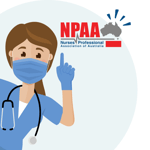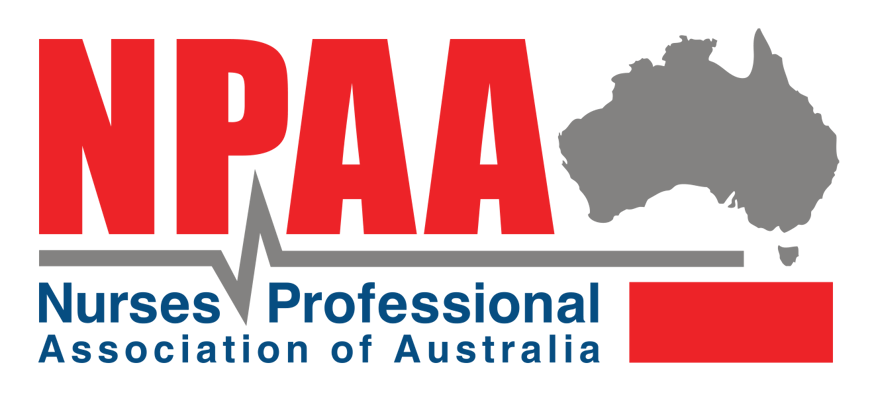Congratulations on completing your nursing education! As you step into the professional world, it's natural to have questions. At the Nurses Professional Association of Australia (NPAA), we understand the excitement and challenges that come with starting your nursing career.
To help you navigate this transition, we've compiled answers to the most frequently asked questions by new graduates. From finding your first job to managing stress and achieving work-life balance, we've got you covered. Dive in and remember, that the NPAA is here to support you every step of the way. Welcome to the nursing community!
How do I find my first nursing job?
Job Searching: Effective job searching is crucial for finding the right position. Start by researching potential employers through hospital websites and nursing associations. Look into government graduate programs, individual private hospital programs, and aged care facilities. Attending career fairs can help you network and explore opportunities, but be cautious with temporary or travel nursing, as these can be challenging for new grads without previous experience. Local health departments, GP surgeries, and agencies can also offer valuable job opportunities. Job boards might not be the best starting point for new grads.
![]() Resume Building: Tailor your resume for each job application, highlighting relevant skills and experiences. Ensure it’s up-to-date, clear, and concise. Include your contact details, a professional summary, detailed clinical experience, certifications, education, and references. Use clear headings and bullet points to organise information effectively. Don’t forget to include skills from other roles, like those gained from retail or personal experiences.
Resume Building: Tailor your resume for each job application, highlighting relevant skills and experiences. Ensure it’s up-to-date, clear, and concise. Include your contact details, a professional summary, detailed clinical experience, certifications, education, and references. Use clear headings and bullet points to organise information effectively. Don’t forget to include skills from other roles, like those gained from retail or personal experiences.
A cover letter is usually also needed.
Networking: Building a professional network is key. Join associations, use LinkedIn, and reach out to alumni. Seek mentors, volunteer, and attend conferences. Informational interviews can also provide valuable insights and connections. Consider roles like AIN or USIN to gain experience and expand your network.
What should I expect during my orientation period?
Orientation days are typically conducted on-site at the facility, and you are expected to come in appropriate workplace clothing, including correct footwear. Remember, this is your first day of work, not a social gathering.
![]() Orientation usually begins with a whole hospital new employee program for a set number of days, which depends on the size of the hospital or facility. During this initial phase, you will cover all mandatory training such as Basic Life Support (BLS), infection control, manual handling, Workplace Health and Safety (WH&S), fire safety, and medication exams.
Orientation usually begins with a whole hospital new employee program for a set number of days, which depends on the size of the hospital or facility. During this initial phase, you will cover all mandatory training such as Basic Life Support (BLS), infection control, manual handling, Workplace Health and Safety (WH&S), fire safety, and medication exams.
Following this, you will move into nursing-based orientation, where you will receive education on workplace philosophies, policies, and emergency procedures.
Next, you'll transition into ward-based orientation, which involves familiarising yourself with the specific unit or ward where you will be working. The time frame for this part of orientation varies depending on your specific ward and the requirements of your role. You will also find out about your grad program and the outline for the year ahead, which may be included in the nursing orientation if the program is provided for all new graduates.
The duration and structure of orientation programs can vary widely depending on the employer, state, and facility. It's best to speak with your educator or HR representative to get detailed information specific to your orientation.
How can I manage the stress and workload as a new nurse?
![]() Managing stress and workload as a new nurse involves a combination of self-care, effective time management, and seeking support. Nursing is both physically and emotionally demanding, which can lead to exhaustion.
Managing stress and workload as a new nurse involves a combination of self-care, effective time management, and seeking support. Nursing is both physically and emotionally demanding, which can lead to exhaustion.
- Prioritise Self-Care: Get enough sleep, eat well, and make time to relax.
Develop Organizational Skills: Use lists, prioritise tasks, and delegate when possible. - Seek Support: Reach out to peers and mentors for guidance.
- Plan Ahead: Arrive early to review patient notes and plan your tasks.
- Use Resources: Keep a journal and research unfamiliar diagnoses.
- Take Breaks: Ensure you take your entitled breaks.
- Practice Mindfulness: Use relaxation techniques to manage stress.
- Set Boundaries: Avoid working extra shifts if you’re exhausted.
What continuing education or certifications should I consider?
When considering continuing education or certifications in nursing, it's important to align your choices with your career goals and work environment. Here are some options to consider:
![]() Stay Updated and Fulfill CPD Requirements: Nursing is an ever-evolving field, making it essential to stay current with the latest research and best practices. To meet the 20-hour CPD requirement for annual re-registration, you can engage in various educational activities such as attending conferences, reading journal articles, and participating in workshops. NPAA has partnered with RedU CPD to offer a library of quality online CPD courses for members. Click here to explore more.
Stay Updated and Fulfill CPD Requirements: Nursing is an ever-evolving field, making it essential to stay current with the latest research and best practices. To meet the 20-hour CPD requirement for annual re-registration, you can engage in various educational activities such as attending conferences, reading journal articles, and participating in workshops. NPAA has partnered with RedU CPD to offer a library of quality online CPD courses for members. Click here to explore more.
Certifications: Depending on your career pathway and work setting, you might pursue specific certifications. For example, obtaining a certification in immunisation could be beneficial if you plan to work in GP clinics. Other small courses, such as Trauma or Cannulation, can also enhance your skills and provide certification, often through internal or external courses.
![]() Academic Pathways: Consider enrolling in transition programs if you're a new staff member or a graduate. These programs are often offered free for the first year at your workplace and can be followed by completing a Graduate Certificate at a university. You can then advance to a Graduate Diploma, Master’s degree, or even a PhD. Some institutions offer education allowances for completing advanced degrees, particularly in state hospitals.
Academic Pathways: Consider enrolling in transition programs if you're a new staff member or a graduate. These programs are often offered free for the first year at your workplace and can be followed by completing a Graduate Certificate at a university. You can then advance to a Graduate Diploma, Master’s degree, or even a PhD. Some institutions offer education allowances for completing advanced degrees, particularly in state hospitals.
Specialisations: If you’re interested in a particular field, such as Midwifery, pursuing specialised education in that area can open new career opportunities.
By choosing the right continuing education and certification paths, you can enhance your professional development and career prospects in nursing.
How do I balance work with my personal life?
Balancing work with your personal life is crucial for maintaining overall well-being and preventing burnout. Here’s how you can achieve a healthy work-life balance:
- Set Boundaries and Manage Time: Nursing can be fast-paced and demanding,
 so it’s important to be organised and manage your time effectively. Develop good organisational habits such as keeping a to-do list, prioritising tasks, and delegating when appropriate. Effective time management will help you stay on top of your responsibilities and ensure that you have time for personal activities.
so it’s important to be organised and manage your time effectively. Develop good organisational habits such as keeping a to-do list, prioritising tasks, and delegating when appropriate. Effective time management will help you stay on top of your responsibilities and ensure that you have time for personal activities. - Prioritise Self-Care: Make sure to carve out regular 'me time' to relax and recharge. Engage in activities you enjoy, whether it’s catching up with friends, pursuing hobbies, or exercising. If you notice yourself becoming disinterested in these activities or isolating yourself, it’s a sign to reassess and adjust your approach to maintain balance.
- Practice Mindfulness: Incorporate mindfulness techniques such as meditation or relaxation exercises to manage stress and maintain mental clarity.
- Set Realistic Goals: Be realistic about what you can achieve, and don’t hesitate to adjust your goals if necessary. This might mean reducing your workload or delegating tasks to prevent overwhelm.
- Learn to Say No: It’s important to recognise when you’re stretched too thin and to say no to additional work if you’re already exhausted. Overextending yourself can lead to safety issues and burnout.
- Seek Support: Communicate with friends, family, and trusted colleagues about how you’re feeling. Sharing your experiences and seeking support can help you manage stress and maintain a healthy balance.
- Engage in Enjoyable Activities: Ensure that you engage in activities that bring you joy and satisfaction outside of work. This can help you maintain enthusiasm and prevent burnout.
- Consider Professional Help: If prolonged stress starts affecting your well-being, consider seeking professional help, such as therapy or counselling.
By integrating these strategies into your routine, you can create a more manageable and fulfilling balance between your work and personal life.
What should I do if I make a mistake?
If you make a mistake, here’s a streamlined approach to handle it effectively:
- Acknowledge and Take Ownership: Recognise the mistake and take full responsibility. Be honest about the error and report it to the appropriate person, such as a medical officer or team leader.
- Communicate Clearly: Inform your team and any relevant parties about the mistake. Effective communication helps prevent misunderstandings and ensures necessary actions are taken.

- Document and Report: Accurately document the error and follow the reporting system. Proper documentation is crucial for transparency and future reference.
- Reflect and Learn: Reflect on what could have been done differently and consider whether additional education or training might help prevent similar errors in the future.
- Seek Support if Needed: If you need further assistance or support, don’t hesitate to reach out to NPAA. We can provide guidance and resources to help you address the situation and improve your practice.
How do I build good relationships with my colleagues?
Building good relationships with your colleagues is essential for creating a positive and effective work environment. Here’s how you can foster strong connections:
![]() Collaborate and Communicate: Nursing is a team-based profession, so effective collaboration with healthcare professionals is crucial for providing comprehensive care. Develop teamwork skills and communicate regularly with physicians, pharmacists, and other team members to ensure coordinated and holistic patient care. Be approachable, use open body language, and engage in positive interactions.
Collaborate and Communicate: Nursing is a team-based profession, so effective collaboration with healthcare professionals is crucial for providing comprehensive care. Develop teamwork skills and communicate regularly with physicians, pharmacists, and other team members to ensure coordinated and holistic patient care. Be approachable, use open body language, and engage in positive interactions.
Be Professional and Approachable: Introduce yourself to your team, team leader, and buddy for the day. Maintain professionalism by being friendly, making eye contact, and demonstrating open body language. Arrive early to help with ward planning and familiarise yourself with ward routines, processes, and priorities.
![]() Seek Mentorship and Guidance: Find experienced nurses who can serve as mentors. Don’t hesitate to ask questions and seek advice from colleagues. Learning from their experience can boost your confidence and skills. Be open to feedback and integrate valuable lessons into your practice.
Seek Mentorship and Guidance: Find experienced nurses who can serve as mentors. Don’t hesitate to ask questions and seek advice from colleagues. Learning from their experience can boost your confidence and skills. Be open to feedback and integrate valuable lessons into your practice.
Stay Positive and Reflective: Approach your work with a positive attitude and be willing to learn. Reflect on your practice, debrief with peers, and discuss experiences with other grads, your educator, or clinical facilitator. Be open to advice on improvement and take opportunities to discuss cases with the multidisciplinary team.
Know Your Resources: Familiarise yourself with your workplace policies and procedures. If you’re performing a new procedure, let your buddy and team leader know so you can receive appropriate assistance. This will help you stay within your scope of practice and ensure patient safety.
By following these steps, you can build strong, collaborative relationships with your colleagues and contribute to a supportive and effective healthcare team.
What resources and support are available to me?
When seeking resources and support, you have several valuable options available:
The Nurses Professional Association of Australia (NPAA):
NPAA's expert industrial support team are some of Australia's best. NPAA guarantees expert industrial support to ensure you're represented for a variety of workplace issues including Bullying, Enterprise Bargaining, pay disputes, internal disputes and more.![]()
Our industrial officers and advocates offer advocacy, guidance on your workplace rights, emotional and workplace support, and even direct branded representation of your interests with most employers.
NPAA’s industrial team can also connect you with appropriate resources, forms, or regulators for your unique circumstances - supporting every step of the way as required.
Professional and Peer Support: Utilise your shift buddy, team leader, and NUM for on-the-job support and guidance. Additionally, you can seek advice and support from peers, colleagues, and educators, including clinical facilitators. Friends and family are also valuable sources of emotional support.
Mental Health and Counseling Resources: For additional support, consider using services such as Employee Assistance Programs (EAP), private counselling, Beyond Blue, and Nurse and Midwife Support. These resources can offer counselling and mental health support tailored to the unique challenges faced in nursing.
Online Resources: There are various online resources available for professional development, educational materials, and support networks. These can provide valuable information and help you stay updated in your field.
The NPAA is here to support you throughout your journey, we are committed to protecting the rights of our members and ensuring that they have a safe and healthy workplace.
 Why is the NPAA different? We believe that real change in healthcare STARTS with empowering frontline nurses, not bureaucrats.
Why is the NPAA different? We believe that real change in healthcare STARTS with empowering frontline nurses, not bureaucrats.
We invite you to experience the support, protection, and advocacy of NPAA yourself.
Want to find out more or have a question? Get in touch with us:
Phone: 1300 263 374
Email: hotline@npaa.asn.au
Or book a meeting
Best of luck in your nursing journey!
Related Posts
Case Win: Pay Disputes in Nursing
How to Deal with Nursing Pay Issues
George, a nurse from the Queensland Branch of NPAA was...
Case Win: Documentation Issues
Advocacy & Support for Nurses
Upon return from sick leave Sasha, a member of the NPAA New South...
Case Win: Dismissing AHPRA Allegations in Nursing
Workplace Support for Nurses with NPAA
Hayley, a nurse member in South Australia, found herself...


